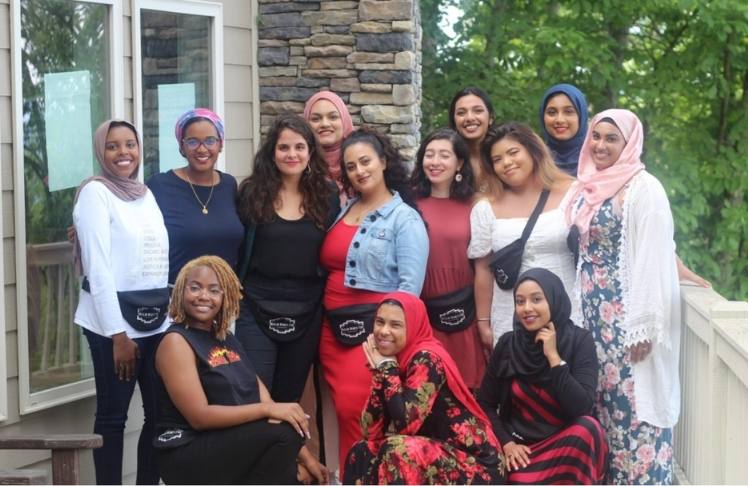
by Nadira Jamerson
This is the first story of a series that spotlights the influence of religion in the Black community and the faith-based organizations working to inspire action, hope, and wellness.
Faith and religion have played an important role in the lives of Black folk in the United States since we arrived on these shores. Black congregations have long served as safe, healing spaces where Black people can come to ease their burdens and unite under ideals of progress and justice.
In the face of today’s rampant racism and daily threats to Black folk’s rights and freedoms, many community members are looking for a space to that will support and uplift them — and Black faith-based organizations are here to do just that, including organizations that support the Black Muslim community.
Although only 2% of Black Americans are Muslim, Black people comprise 20% of the overall Muslim population in the United States, according to a 2017 Pew Research Center survey.
“The question has always been, are they organized and do they believe that they have power in society — and if they don’t, that’s typically for a reason,” says Doha Medani, co-founder and director of digital strategy for Muslim Women For, a North Carolina-based organization focused on educating and empowering Black, brown, and immigrant Muslim women, as well as queer, trans, and non-binary folks.
Founded in 2017, Muslim Women For hosts social justice and wellness events to unite Muslim women and marginalized folks. With less than a month before the 2022 midterm elections, the nonprofit’s using their resources to ensure that Black Muslims make it to the polls. Their website features a Muslim Voter Guide which helps members learn how they can get involved with mobilizing efforts and make a plan to vote.
“We also are a C-3 organization, so we try to do get-out-the-vote opportunities in North Carolina,” Medani says. “For the election cycle this year, we have three community organizers all of whom are these awesome folks who are super involved in their community and are going to be doing various events. They have a certain number of events they have to do and groups of people they are supposed to talk to who should be registering.”
Mobilizing around voting is just one aspect of the faith-based group’s work to turn faith into action. The year it was founded the organization held a vigil for Nabra Hassanen, a Black Muslim woman who was kindnapped and killed by a man while walking home one night in Washington, D.C. Muslim women are more likely to be the victims of religious violence than Muslim men, but their stories are often not shared as widely. The vigil held by Muslim Women For allowed for their membership and volunteers to come together and mourn their community member and uplift Hassanen’s story, while also imaging a better way forward.
“Most of the leadership — whether it’s social justice organizations or religious organizations or advocacy groups — is typically men even though a lot of the struggles, including violence toward Muslims, is usually faced by women, queer folks, and gender-nonconforming folks, and not necessarily by men,” says Medani says.
“Our organization proves that if we do get organized, we do have the power to create change. The purpose of our work is to make sure people are not only part of their community but that they are actively working toward a goal.”
Some of the greatest civil rights leaders in history, including Reverend Martin Luther King Jr. and Malcolm X, have relied heavily upon religious teachings to mobilize, inspire hope, and promote social justice within the Black community.
Similarly, Muslim Women For’s five pillars of political education, leadership development, relationship building, empowerment for the historically marginalized, and grassroots organizing create a space “for people to not only participate in advocacy and participate in political education, but also to do it in a way that is in line with their religious and political beliefs,” Medani says.
Along with amplifying the need for justice and equality, researchers have found that religion and participating in faith-based groups can also lead to a variety of health benefits, including improved heart health and better mental resilience during tough times.
To that end, in 2020, Muslim Women For hosted a series of wellness circles helping their members and volunteers through the stress and isolation of the COVID-19 pandemic.
“We had about 30 organizers in North Carolina who participated in that and we were able to give them a stipend for participating,” Medani explains. “There was a yoga session, an art session, a creative writing session, and we were able to pay people in the community who we knew could offer that.”
While Medani believes that religion does not solve all of the world’s problems, she is grateful for the opportunity to participate in Muslim Women For and be a small part of creating change in the community.
“Ask yourself what you can give to the world that no one else can. I know that sounds so lame, but taking that and trying to find a space or create your own space — even if creating space for that is just two people you know who want to go volunteer — it can be so simple,” she says.
“So many people are always talking about destroying things and tearing things down — like we need to abolish this and abolish that,” Medani says. “And while I think a lot of that is really valid, I also think we don’t spend enough time thinking about, what can we build together?”















